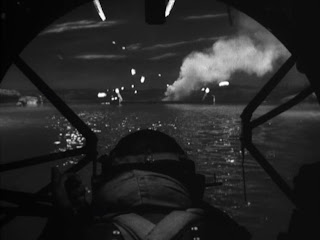
In his sixty year career as director, Michael Anderson has chalked up over 40 features for cinema and television. He has a proven track record as a director of war films, sci-fi and espionage. His filmography includes 'Operation Crossbow', 'The Quiller Memorandum', 'Logan's Run' - commercially successful in their day and, to a greater or lesser degree, still reasonably popular. On the flip side, we have 'Doc Savage: Man of Steel' and 'Orca: Killer Whale' (succinctly: semi-colons in the title = avoid).
A decade into his career he made his one bona fide classic, a strong contender for the title of finest British war movie ever made: 'The Dam Busters'.
So how come 'The Dam Busters' is so good when the rest of his work runs from the acceptably entertaining to the ploddingly routine by way of the completely forgettable ('Second Time Lucky', anyone)?
Three reasons, I think:
1) A thoughtful and clear-sighted screenplay by R.C. Sherriff, drawing on Paul Brickhill's eponymous book and Guy Gibson's memoir 'Enemy Coast Ahead', which follows the story from development and trialling of Barnes Wallis's revolutionary bouncing bomb through the formation of 617 Squadron and their legendary bombing run - incurring heavy casualties - on the Ruhr dams.
2) Eric Coates' timeless 'Dam Busters March' - a work not actually written for the film (Coates was no aficionado of composing for the cinema and generally turned down commissions for film work) but, by coincidence, completed as an exercise in an Elgarian march and given its title just days before the film's producers prevailed upon him to contribute to the score.
3) The story has everything that even the most over-heated script writer's imagination could dream of - a new, unorthodox weapon; a visionary scientist up against committees and bureaucrats; an elite unit put together for the purpose of a top secret mission; a desparate bombing run involving low-level night flying, heavily fortified enemy targets and an objective that could shorten the war - with the added benefit that it happens to be true*.
Or rather, the curious synergy of these three elements. Curious because the Boy's Own thrilleramics that even a cursory checklist of the film's narrative components (point 3) seems to promise is held firmly in check throughout - and often entirely negated by - the refusal of Marshall's script to indulge in obvious melodrama or gung-ho tub-thumping (point 1) and the emotive admixture of resilience and melancholy that imbues Coates's music (point 2). To describe 'The Dam Busters' in terms of the stiff-upper-lip Britishness specific to that time (a film from the mid-50s looking back to events of the mid-40s) would be a little too obvious, as well as verging on cliche. And yet there is about it a quietness, a calmness - even (especially) in the scenes of the Lancaster bombers holding steady at just 60 feet above the surface of the dams, flak peppering the sky around them, the bomber aimer's voice intoning "Steady ... steady" with almost preternatural detachment - that for all its understatement is redolent with the courage, the spirit, the heroism of the men it portrays.

'The Dam Busters' shares with 'Appointment in London' the depiction of flyers for whom hazardous missions, anti-aircraft fire and the prospect, every time they took off, that this mission could be their last were quite simply the accepted facets of a night's work. These were men for whom the extremes of aerial warfare were just a job. The last scene, between Gibson (Kenneth More), just back from the mission, and Wallis (Michael Redgrave), distraught at the squadron's losses, is a perfect example. When Wallis opines that if he knew how many men would be lost he would never have "started this", the pragmatic Gibson recommends that he see the base's medic for a sleeping pill and try to get some rest. Wallis enquires if Gibson is going to call it a day. A shake of the head, despite the long night and devastating mission he has just endured. "I've got some letters to write," Gibson says. More's delivery nails the pragmatism, the normality of it. No big emotional speech, no watery eyes or wavering voice. Instead, a realistic acceptance underpinned by a steely resolve that the job has to be done.

Or, to put it more succinctly, 'The Dam Busters' is refreshingly free of heroics while remaining, indubitably, a film about heroes.
*The film takes commendably few liberties with historical fact, and those it does are mainly in regard to Wallis's struggles to convince the top brass of the practicality of the bouncing bomb.

Tidak ada komentar:
Posting Komentar